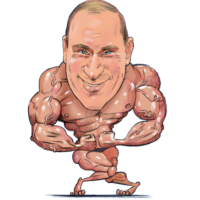
Is UCONN Bad for Women’s Basketball?
You know what I’m not watching right now, even though I love sports and hail from the otherwise unnoteworthy state of Connecticut? That’s right, I just cannot bring myself to watching the women’s NCAA basketball championship, a certain victory for the University of Connecticut and yet one of the more remarkable sports triumphs of the past century. It simply isn’t watchable. Now hold on and give me my thousand words before you start getting your panties, or other assorted undergarments, into a bunch and proceed to call me a sexist. I promise you I have a point to all of this.
Part of what makes sports compelling is the competition, the legitimate chance, however small, that each team could win. We watch games to see who wins, not by how much. With UCONN women’s basketball, that just isn’t the case. Their game against Syracuse for the national championship, an 82-51 rout, was determined long before it began. This team has gone 116-1 over the past three seasons and won its tournament games this year by an average of almost 40 points. Don’t give me some nonsense about how Tiger Woods’ or the Chicago Bulls’ dominance were good for their respective sports. They at least still had some reasonable competition. Even in his prime, Tiger still lost golf tournaments all the time, though you might have wagered on him against the field. And Jordan’s ’95-’96 Bulls team, with the best record in the history of the sport, still lost 10 regular season games. The UCONN women have only lost one game in three years.
Are the UCONN women thus bad for the game of women’s basketball? Yes, perhaps they are in the sense that it makes their games lack for drama or interest. But that’s not their fault. What were Geno Auriemma and Breanna Stewart supposed to do? Play dead and let Syracuse have a fighting chance? Hell no, their job is to win basketball games and kudos to them for doing so in such historically demonstrative terms. Still, it is left to us to ask the all-important questions, “Why is women’s basketball so lopsided, and how do we remedy the problem so that women’s basketball can enjoy the same parity that makes the men’s game so much more entertaining?”

The answer to the former question leads us to confront some of the underlying gender issues involved in modern athletics. Title IX has been widely helpful in guaranteeing women equal access to a collegiate student athlete experience. But just as racism has lingered in the attitudes and interactions of our society long after the civil rights movement created legal protections for people of all ethnic backgrounds, so women continue to confront latent gender stereotypes and understandings that minimize their roles as potential athletes.
The result is that there are far fewer exceptional female athletes than there are male athletes. As skilled as the UCONN women are, they would lose regularly if pitted against the top 25 teams from the men’s bracket. I am convinced, however, that the reason is sociological not biological. In all my years of coaching, the greatest athlete I ever coached, the only who has gone on to make her living as a professional athlete, is Jackie Thode, who currently plays hockey in Austria. She was not just competitive against her male counterparts, who she played alongside, she was better than them. And when she hit some young punk who gave her grief because he thought she was “just a girl”, they never made that mistake twice. Jackie Thode, Breanna Stewart, Lindsey Vonn- there are plenty of examples out there that women can be every bit as good at their respective sports as their male counterparts.
But just because they can be that good doesn’t mean that they are expected or encouraged to be. How many parents are out there night after night doing layup drills with their daughters as compared to the number doing so with their sons? We as a society still don’t view young women as potential athletes the same way we view boys. Girls are not given the same encouragement and parental dedication. Sure, there are exceptions (like the parents of Jackie, Breanna, and Lindsey), but they are far fewer and further between, so the number of world-class female athletes, dedicating themselves to their sport with a passion that sets them apart, is far fewer.
And thus a school like UCONN, known for turning aspiring young female basketball players into professional athletes, can hold a monopoly on acquiring these few players. In men’s basketball, there are so many young athletes, all of whom have dreams of making their fortunes in the NBA, that no 12-man squad can have them all, and thus they are spread out more evenly across the spectrum of NCAA Division I schools. This makes the men’s game more competitive and thus the vicious cycle of diminishing women’s sports is perpetuated.
The final piece to this puzzle comes at the professional level. How many of you even knew there was a professional women’s hockey league in Europe before I mentioned it? Exactly. How many of you have ever watched a WNBA game? Exactly. Correspondingly, the salaries for women’s sports is far less than for their male counterparts. The average WNBA salary is $72,000. The average NBA salary? How about 4 million? In fact, 52 individual NBA players make more than the entire WNBA combined. The US women’s soccer team is set to protest this year because they still make significantly less than their counterparts on the men’s national team, even though they have routinely been far more successful and are consistently a bigger draw for television ratings. The reality is that there is a smaller market for women’s professional sports, and they are paid substantially less, even when they are better athletes. So of course the draw to push your daughter to excel in her sports aspirations is far less.
Only when we take women’s sports seriously, not just with lip service and political appeasement, will women truly enjoy the same opportunities as men. As for me, I plan on taking my daughter to a WNBA game. Maybe she’ll get a scholarship to UCONN so daddy doesn’t have to pay for college…
Steven Craig is the author of the best-selling novel WAITING FOR TODAY, as well as numerous published poems, short stories, and dramatic works. Read his blog TRUTH: in 1000 Words or Less every TUESDAY and FRIDAY at www.waitingfortoday.com






